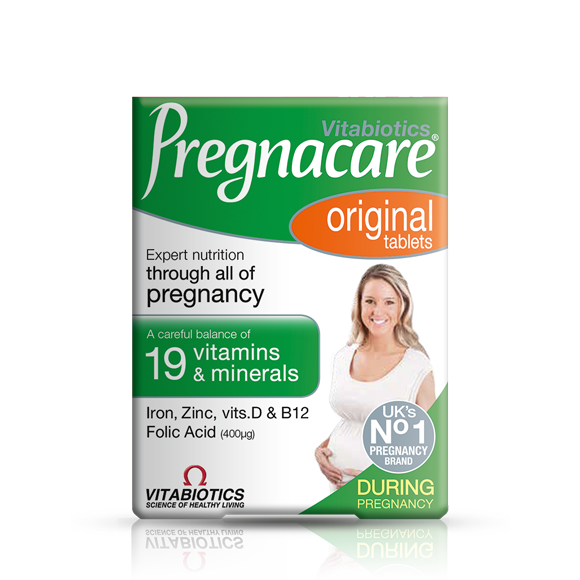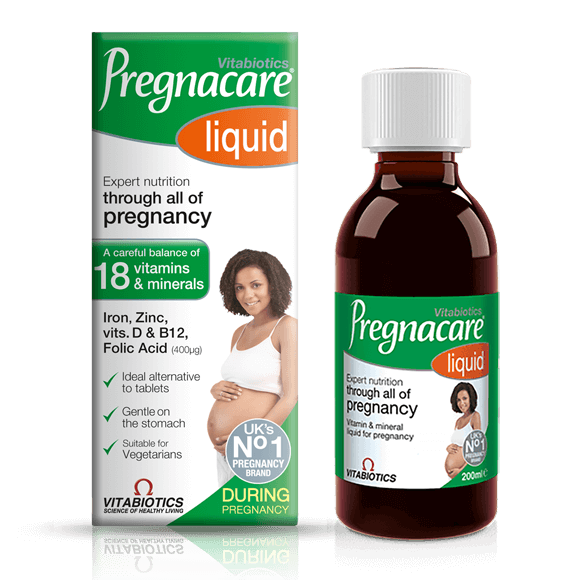Are you pregnant (or thinking about trying to conceive) and unsure about why you should take a combined pregnancy vitamin supplement? Here are ten reasons to consider it
Finding out that you are pregnant is an incredibly exciting time, but one that brings with it a whole new world of questions. What should you eat? What should you *not* eat? And where sells the best maternity jeans?!
One question you may have is around what vitamin supplement to take before and during pregnancy, especially as advice on what to take can sometimes be confusing.
The Pregnacare pregnancy supplement range includes products for before, during and after pregnancy. We outline ten reasons why you should think about taking a specialist pregnancy supplement:
Why You Should Take Supplements During Pregnancy:
1. Includes B Vitamins
Taking a combined pregnancy multivitamin can help support a healthy, well-balanced diet to make sure you give your body all the nutrition it needs at this crucial time when you’re trying to conceive (TTC). If you’re thinking about trying for a baby, did you know that you may be low in B vitamins if you’ve been taking the contraceptive pill for a long time? And like many people you might not have the most balanced diet pre-pregnancy, especially if you work hard - and socialise frequently - too.
2. Folic Acid Included
Pregnacare pregnancy supplements contain Department of Health-recommended levels of 400μg folic acid, which you’re advised to start taking at least three months prior to starting TTC and during the first three months of pregnancy, to help prevent neural tube defects (here’s why folic acid is so important). Supplemental folic acid intake increases maternal folate status†. Low maternal folate status is a risk factor in the development of neural tube defects in the developing foetus. Folic acid is also beneficial beyond 12 weeks as it contributes to maternal tissue growth during pregnancy.
It is also recommended that vitamin B12 is taken with folic acid at this time, as it works closely with folic acid. Research suggests* taking a daily supplement of at least 2.5µg of vitamin B12 (the EU NRV) with your main meal, in addition to the recommended daily 400µg supplement of folic acid, should be considered.
* Addition of Vitamin B12 to folic acid supplements to optimise the prevention of Spina Bifida and other Neural Tube Defects, Professor John M. Scott, Biomedical Sciences Institute, Trinity College, Dublin 2, Ireland
†The beneficial effect is obtained with a supplemental folic acid daily intake of 400µg for at least one month before and up to three months after conception.
If Flour In The UK Is Fortified With Folic Acid, Do I Still Need To Take An Additional Folic Acid Supplement Before And During Pregnancy?
Yes, you will still need to take a supplement as fortification is only to improve the folic acid contribution from the normal diet. The government announced in September 2021 the good news that folic acid will be added to UK white flour from the end of 2026 (the new rules will exclude gluten-free and wholemeal flour). This is to help increase the amount of folic acid in maternal diets, as low folic acid status is a risk factor in the development of neural tube defects (NTDs), such as spina bifida. This will, however, not replace the need for mums-to-be to take a folic acid supplement, as the UK Department of Health continues to recommend that all women trying to conceive until the 12th week of pregnancy should take a daily supplement containing 400µg folic acid.
3. The Right Level Of Vitamin D
The UK Department of Health recommend that everyone take a daily supplement dose of 10μg of vitamin D, this includes pregnant women, breastfeeding mums and children under five, vitamin D helps maintain normal teeth, bones, muscle function and the immune system.
Make sure you look for this level in a combined pregnancy supplement, in addition to folic acid.
You can also read our post on vitamin D in pregnancy.








Comments (0)